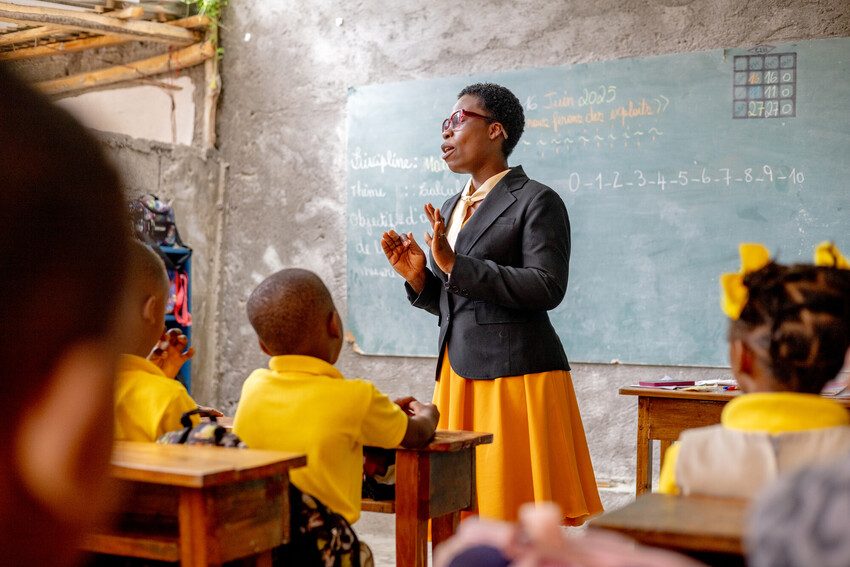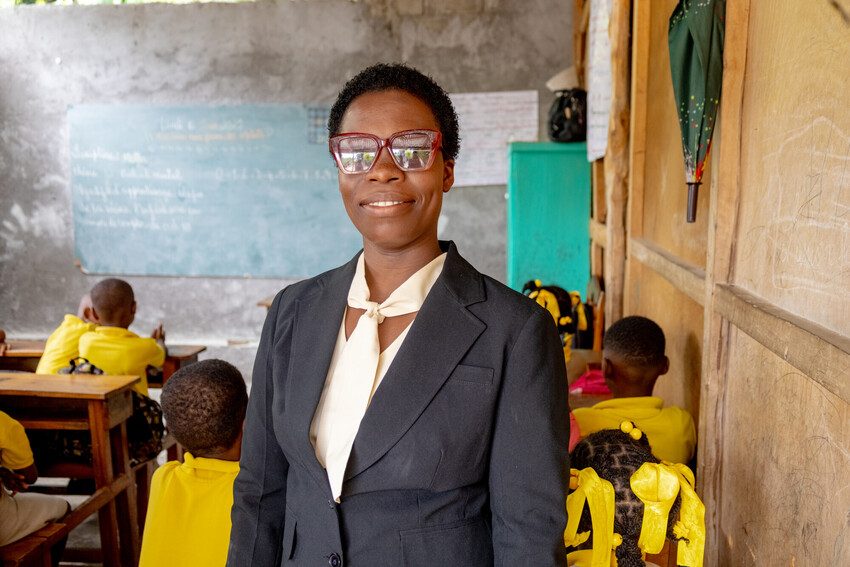Whether it’s supporting displaced children or promoting gender equality, head teacher Rose is transforming classrooms into safe spaces for healing.
In Haiti, where the internal displacement crisis has uprooted over 1.3 million people, including 700,000 children, 33-year-old Rose is a teacher and mother of 2 daughters, aged 6 and 7. After attending a training programme with Plan International, Rose’s passion for nurturing young minds has deepened and she has used the skills to support displaced children facing unimaginable challenges.

Overcoming challenges: Violence, trauma, and scarcity
Haiti’s education system is under immense strain. Since December 2024, the number of school closures has surged by 60%, disrupting the education of over 243,000 children. Currently, more than 80 schools serve as shelters for displaced families, while 166 schools have relocated to makeshift facilities lacking basic infrastructure.
Violence and insecurity further exacerbate the crisis, leaving children vulnerable to exploitation, abuse and recruitment by armed groups. For Rose, these challenges are personal. “Children from Port-au-Prince sometimes lack materials like books,” she explains. “Many parents can’t afford them, and the children are reserved, bottling up their trauma.”
A new approach to teaching and equality
The training covered critical topics such as safeguarding, children’s rights, gender equality and psychosocial support, and was attended by 300 teachers. Rose learn how to engage children, manage their stress and provide emotional support, particularly for those displaced from Port-au-Prince.
“I have always loved children,” Rose says. “This training taught me to be more playful with them, pay closer attention, and protect their rights.” She was particularly struck by the emphasis on gender equality. “As a woman, I learned that I have valuable qualities that must be recognised, just like those of boys and men.” This realisation has encouraged Rose to promote equality in her classroom, ensuring that every child, regardless of gender or background, feels valued.

Creating a sanctuary of support
Rose’s school welcomes displaced children with open arms. “When a child arrives from Port-au-Prince, we introduce them as a new friend or sibling,” she explains. “We encourage the other children to look after them.” This approach has eliminated bullying and created a supportive environment. Rose recalls one boy from Port-au-Prince who was initially shy and withdrawn. “He was traumatised,” she says. “But we didn’t judge him. We talked to him, involved a psychologist, and now he’s thriving and feels comfortable with his teachers and peers.”
The school also addresses material shortages. “We keep extra books and documents for children who can’t afford them,” Rose explains. “These are gifts, not loans, because we believe that children can’t learn without supplies.” Despite financial strain, Rose and her team ensure that every child has access to education and even cover their costs when parents cannot contribute.
Hope for Haiti’s future
Rose’s commitment goes beyond logistics. She places particular importance on providing personalised support, recognising that every child has their own unique challenges. “Teaching is not easy,” she says. “Training reminds us that every child needs support tailored to them.” This approach aligns with Plan International’s broader goals of social inclusion, child protection, and emotional well-being.
One story Rose shares encapsulates her mission. A young girl dreamed of becoming an engineer, but was ridiculed for pursuing a “boy’s” profession. Undeterred, she proved her worth, showing that women can contribute just as much to society as men. Inspired by this story, Rose advocates equal opportunities, ensuring her students know their potential is limitless.
Rose’s work is a testament to the resilience of Haiti’s people in the face of crisis. “Children are the future of our country,” she says. “We must support them, not judge them.” By applying her training, she is transforming her school into a sanctuary of learning and healing, ensuring that Haiti’s children have the opportunity to thrive despite the odds.
Rose first started teaching in 2018, but her promotion to head teacher has enabled her to amplify her impact. In May 2025, she attended Plan International’s training workshops as part of a 12-month project in Grand’Anse in partnership with the Fondation Progress & Development and funded by the Regional Humanitarian Fund for Latin America and the Caribbean.The project also involves distributing school kits, rehabilitating infrastructure, and organising recreational activities to engage vulnerable children.


